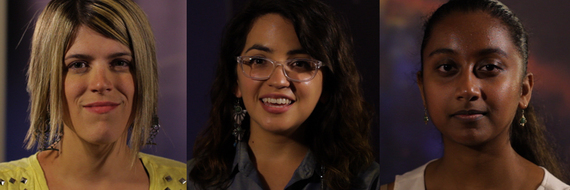Seventh grader Alyssa Carson grabbed recent headlines because she wants to be one of the first humans on Mars. Accumulating the right stuff starts early these days. This young woman has been pursuing her space dream since she was in diapers.
She's been on a tear, attending Space Academy, Robotics Academy, National Flight Academy, NASA's Space Flight Academy, Sally Ride Academy, Sally Ride day camps, Space Camp Turkey, Space Camp Canada -- and every other space camp in the world. She's witnessed three space shuttle launches. She's done a TEDx talk in Greece. She's an official Mars One ambassador, with a featured profile on the Mars One site.
She tweets her adventures. She puts multilingual videos (she's fluent in four languages) on her Facebook page, where she's listed as a "public figure" -- which means you can "like" her but not "friend" her.
She and her father Bret Carson have a 20-year plan that includes higher education at Cambridge and the International Space University, followed (if all goes well) by her mission to Mars sometime in the 2030s.
NASA's Paul Foreman says she's "taking all the right steps to actually become an astronaut."
Is Alyssa truly on a fast track to Mars? And is this how it's done these days -- with early and enormous public fanfare?
I don't know whether Alyssa comes from a privileged background, whether her family pays out of pocket for her prestigious prep school and her many space adventures, or whether she has patrons or sponsors. What I do know is that most girls don't have nearly the level of support or the number of opportunities she seems to have -- and those who do have something like it haven't had it for nearly as long.
Recently I interviewed several summer interns at the SETI Institute in Mountain View, California, who consider themselves fortunate to be working with the likes of Contact inspiration Jill Tarter. These bright young women all have space dreams. They all want to go to Mars.
"Sign me up," said Lindsey Lesh, who attends Bowling Green State University in Ohio. "I'll go colonize it right now."
But when asked about the support they'd had for their space dreams, they were unanimous in their opinion that the opportunities they currently have arrived only recently -- not until they went to college and declared a major in one of the space sciences. They all wish they'd been encouraged sooner.
Lindsey currently is "lead stargazer" in her university astronomy department, but she said she "never felt pushed to go into science" in high school.
"All the way through high school there was no science," said Katie Rodriguez, who goes to Cal State Long Beach.
"You basically have to get into college first before you get that support," said Divya Persaud from the University of Rochester. "A lot of girls don't make it to college, especially minority women."
Divya recently worked with a science program for inner-city middle-school girls -- "some of the most brilliant children that I've ever met," she said. "They wanted to do aerospace engineering, but they didn't have the resources that they needed, and that's why they were there. Of course there was a program, but it was just two weeks."
I have no doubt that Alyssa is a hardworking and deserving young woman, but for every fortunate and well-tended Alyssa, there must be thousands with similar dreams, many more who are restless, questioning, unsure -- perhaps not even able to articulate that these dreams exist (and certainly not in four languages!), much less see a way to pursue them. They may attend schools that are stretching just to teach the basics. The best they can hope for is an eventual recognition of their determined efforts, followed by the sustained support they'll need to fuel their efforts toward realizing their ambitions.
Our earliest astronauts were test pilots; their selection followed strict criteria of age, gender, and flight experience that severely limited participation. Are we in danger of creating another exclusive group of spacefarers -- those with the wherewithal to prepare themselves from an early age, the funds to travel the world, someone to manage their futures, and the social media savvy to promote themselves in all the right places?
There may be better ways to populate a space program. We live in a community of hopeful spacefarers. We talk about the importance of STEM education for all our young people, yet so many are left behind. Some are never even in the mix, while others get STEM experiences in spades. We should commit ourselves to recognizing and nurturing all our young people with the desire and the drive to succeed -- until no young spacefarer is left behind.
Lindsey, Katy and Divya, summer 2014 interns at the SETI Institute. They want to go to Mars too!
CORRECTION: An earlier version of this post misspelled Jill Tarter's name. It has been updated accordingly.
